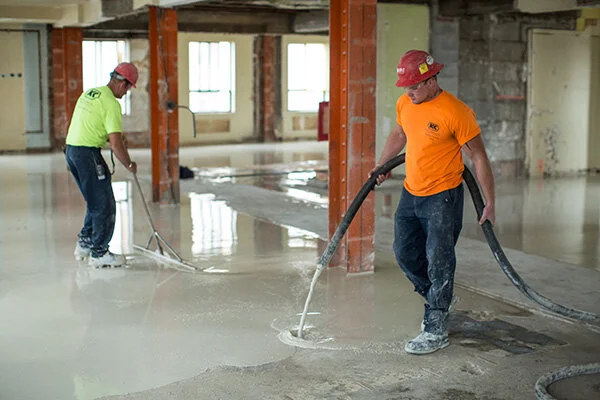Gypcrete is a building material commonly used for sub-floors in commercial and multi-family buildings. It is lighter weight than concrete and offers sound and fire control properties. Here are some frequently asked questions concerning gypcrete:
What Materials Are Used To Make Gypcrete?
Gypcrete typically consists of gypsum powder, Portland cement, and a proportion of sand mixed using continuous mixers. Water is added to this mixture to form a slurry. Other additives may also be added to improve the properties of the mixture, such as accelerators or retarders.
How Do You Install Gypsum-based Concrete?
Before installing the gypsum concrete, the floor’s surface should be clean, dry, and free from any debris. Once the water has been added to the gypsum mixture, the slurry is poured across the floor. It is then flattened and leveled to form a smooth surface with a consistent thickness. The gypsum concrete will need time to dry and cure before installing flooring on top.
Where Can You Use Gypsum Concrete?
Gypsum concrete can be used as an underlay for tile, hardwood, vinyl, and carpet flooring. It is commonly applied in industrial, commercial, and residential buildings to provide smooth and even flooring surfaces. The mixture can also be used as a sound barrier between floors in multi-story buildings and as an option for radiant heating installations.
What Are the Benefits of Using Gypsum Concrete?
Gypsum concrete is formulated to have self-leveling properties. When properly mixed and poured, it can flow and settle to create a smooth, level surface without the need for extensive manual leveling. It helps prevent issues such as uneven floor coverings and reduces the need for extensive floor preparation. Gypcrete offers good sound insulation and soundproofing qualities, as well as minimal shrinkage and cracking. It is generally lighter in weight compared to traditional concrete, which can be advantageous in situations where reducing the load on a structure is important. Gypsum concrete can also be applied over existing flooring in renovation projects, providing a cost-effective way to level the floor without the need for extensive removal of old flooring materials.
How Much Time Does Gypsum Concrete Take to Dry?
The drying time will depend on the type of gypsum concrete used. Some brands can be installed and ready to go in 90 minutes, with the maximum strength being reached in 10 to 14 days. Humidity, temperature, and thickness of the mixture may impact the time needed for gypsum concrete to dry.
What is the Cost of Installing Gypsum Concrete?
The installation costs of gypsum concrete are determined by the slab’s thickness, installation location, project size, and installation labor. Purchasing larger quantities of gypsum concrete may result in a lower per-bag cost. You can consult with construction and flooring professionals to determine the amount of gypsum-based cement needed for your project and its estimated cost.
Should You Involve a Professional in Installing Gypsum-based Concrete?
It is often recommended to hire a professional to install gypcrete successfully, as the installation of gypsum-based cement requires specialized equipment and knowledge. This includes measuring the right proportions for proper mixing of the gypsum concrete and working efficiently to achieve a consistent thickness and level surface. Professionals are also knowledgeable about local building codes and standards that need to be followed during the installation process.
Try Gypcrete for Your Next Construction Project
Gypcrete has lightweight, quick-drying, and self-leveling properties. It is a great option for managing noise levels in multi-story commercial and residential buildings. Purchase your gypcrete products from a reliable supplier that offers a variety of options for your project needs. Consider hiring an experienced gypcrete professional for efficient installation and project management.










